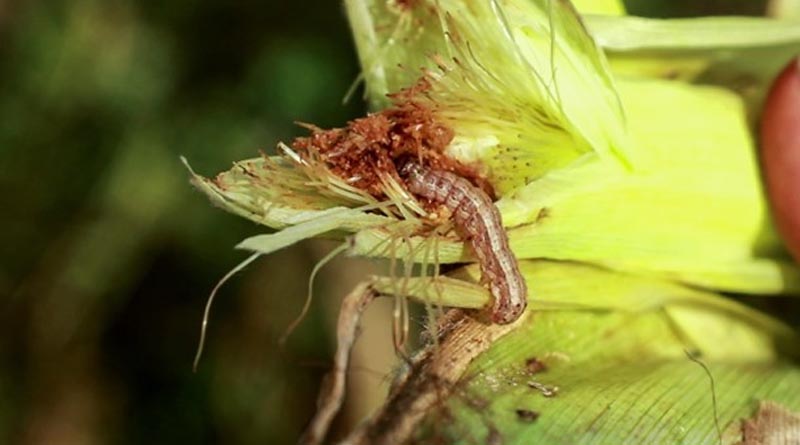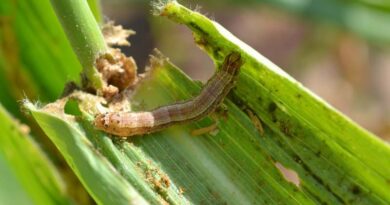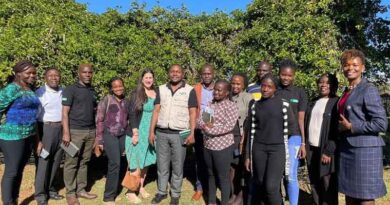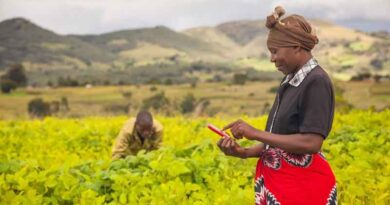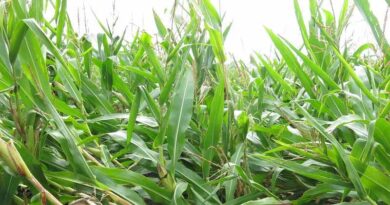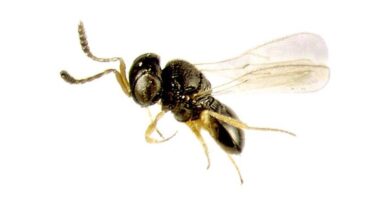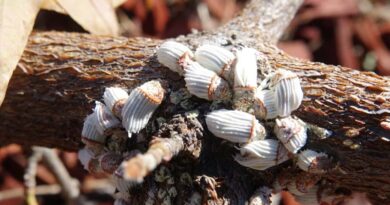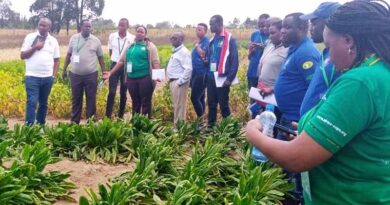CABI empowers farmers in Kenya on a cost-efficient, sustainable, and promising alternative for fall armyworm management
19 December 2023, Africa: Researchers from CABI’s regional centre for Africa organised a farmer’s field event in Machakos County, Kenya, providing comprehensive training to 582 farmers regarding the production of baculorvirus-based insecticides for managing the fall armyworm (Spodoptera frugiperda).
The team also conducted assessments to gauge the farmers’ proficiency in fall armyworm management through biopesticides, addressed challenges faced by small-scale farmers, and evaluated their attitudes and receptiveness toward adopting this innovative baculovirus production technology.
The farmers were trained by CABI researchers including Violet Ochieng, Research Officer specializing in ISM-Drone Technology, Stacey Odunga, Research Assistant, and Maureen Njenga, who is also a Research Assistant.
Destructive pest
Fall Armyworm is a destructive pest and has caused extensive damage to crop for years. It poses a significant threat to food security and livelihoods. The pest mainly affects maize, which is the main cash crop for millions of smallholder farmers in Africa, but also threatens over 80 other plant species.
Farmers mainly rely on synthetic pesticides, which are expensive, and most of them have not been found satisfactory to eradicate this invasive pest. This inadequacy could stem from farmers’ limited purchasing capacity, leading them to opt for cheaper products, a lack of awareness about suitable options, difficulties in accessing effective products, and a rise in the resistance level of pesticides to this pest.
Also, the overuse of these chemicals could have adverse effects on food quality, the environment and food safety, necessitating a more sustainable and environmentally friendly solution.
In response to these challenges, the Plant Health Initiative project, led by Dr Ivan Rwomushana, CABI’s Senior scientist, Invasive Species Management, is actively assisting farmers in adopting safer and sustainable approaches to boost their crop yields.
This support involves comprehensive training and testing the efficacy of different pesticides, with a key focus on FAWLIGEN which is a biological insecticide based on the Spodoptera frugiperda nucleopolyhedrovirus (SfMNPV) for the specific control of the larvae of the fall armyworm.
In July of this year, CABI also established two experimental maize farms in Kitie and Itumbini villages in Machakos County for the purposes of research and training.
A cost-efficient and promising baculovirus alternative
What sets FAWLIGEN apart is its benefit to farmers who cannot afford to purchase the commercial product every season.
A 100ml bottle of FAWLIGEN, priced at KSH 1500, is applied during the early stages of maize growth at a rate of 100ml/ha in 250L of water or 8ml in 20L of water. Depending on the quantity ingested and the timing of virus ingestion, the larvae will die within a few days or during the next stages of their development.
The advantage here is that farmers do not need to invest more money in restocking; they can collect infected larvae and produce their mixture, such as 100-150 larvae, crushed using a pestle and mortar and mixed in 20L of water for respraying.
This highly specific naturally occurring pathogen is not only beneficial for the environment and human health but also represents a sustainable and cost-effective solution that most farmers can afford.
The product has received regulatory approval in Kenya, making it a beacon of hope for farmers battling the fall armyworm.
Formally launched on 28th May 2021, the product represents a culmination of efforts started in 2018 under the CABI Action on Invasives programme that aimed to develop feasible and sustainable biological control strategies for the pest.
AgBiTech, the parent company behind FAWLIGEN, supports the work CABI is doing on training small-scale farmers to re-produce their biopesticide mixtures, promoting accessibility and sustainability.
More awareness needed
The field day played a pivotal role in highlighting the challenges encountered by farmers. Despite the collective efforts of the government, scientific organizations, and academia to curb the spread and impact of the fall armyworm, insights from face-to-face interviews – with 102 randomly selected farmers – revealed a significant gap in their essential knowledge about the pest and effective management.
As the sun sets over the lush fields of Machakos County, a new hope rises. The “FAWLIGEN Baculovirus” paints a picture of resilience and innovation in the face of agricultural challenges. It reminds us that, with determination and science on our side, we can win the battle against even the most persistent problem.
The fight against the fall armyworm is far from over, but thanks to FAWLIGEN and the dedicated individuals behind this research, scientists are one step closer to securing crops, ensuring food security, and fostering sustainable farming practices.
Also Read: Four New Baby Plum Tomatoes with ToBRFV Resistance
(For Latest Agriculture News & Updates, follow Krishak Jagat on Google News)

